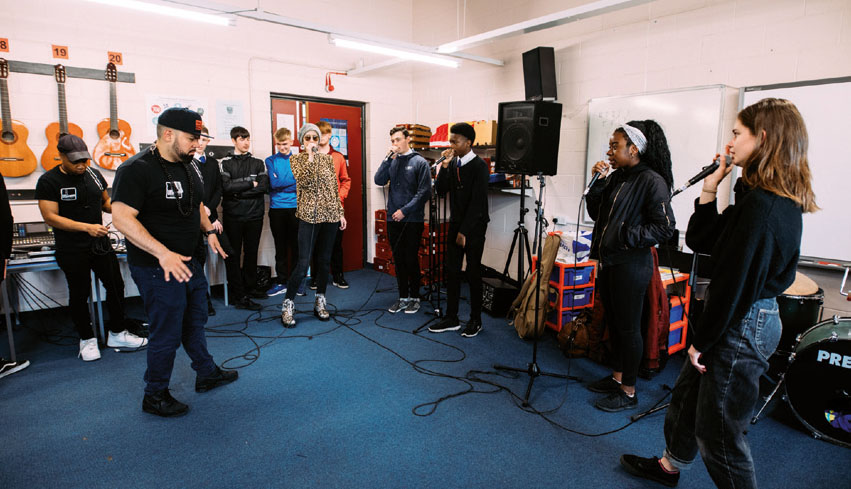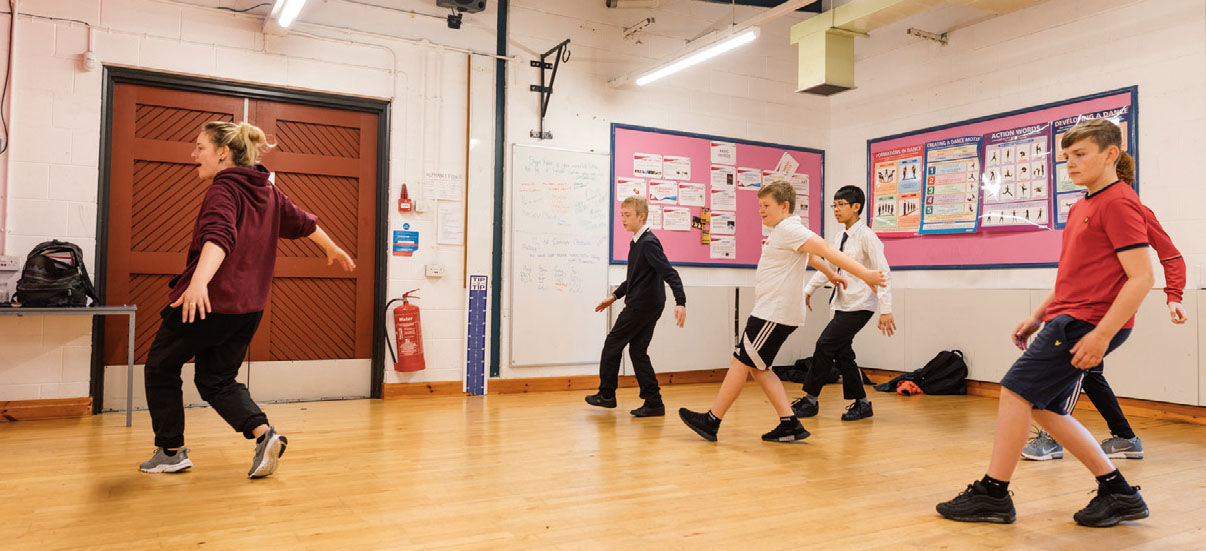
Before they came in, I was a wee bit worried that it might be tokenistic. We might go to a few shows, or we might get artists coming in occasionally. Was it just going to be more work for everyone? But it absolutely hasn't been like that’.
Alison Fair is one of the depute headteachers at Leith Academy, just down the road from Edinburgh city centre. She's speaking to me about the school's multi-year residency from the Edinburgh International Festival (EIF), the bedrock event underpinning the profusion of festivals that engulf the city with arts and culture every August.
The residency
Every self-respecting arts organisation boasts an education department these days, but with its Leith Academy partnership, the EIF has taken this several steps further. Since 2018, the festival has been thoroughly immersed in the school's activities, offering collaboration and support in a deeply rooted partnership based around the school's own aims and needs.
Caroline Donald, the EIF's head of learning and engagement, summed up the project's two-way focus: ‘The point of the residency is for the festival to enrich the life of the school, but also for the school to enrich the festival.’ This is not the first time that the EIF has collaborated in this way – a previous project ran with Castlebrae Community High School between 2015 and 2018. ‘We wanted to build on the success at Castlebrae,’ Donald added, ‘but we always knew we'd make this project bespoke to Leith Academy. We didn't take the approach that this residency was going to happen to the school. We went in, we listened, and from that point we curated together the relationship we now have.’
In practical terms, the project worked in part because acting as the point of liaison between the two institutions became the central focus of the festival's learning and engagement officer. ‘I'm the person on the ground,’ says Amy Firth. ‘I've become the route through which everything goes – working in the school at least one day a week; building relationships; organising all the various projects.’
On the other side of things, Donald tells me that there has been nothing but enthusiasm from Leith Academy. ‘We've only been able to make it work because of the passion from right across the school, from the senior leadership team to the front office, and from the teachers to the janitorial staff. The residency was never designed just to sit within music, drama and the expressive arts – it was always about working with the whole school and its wider community.’
A team effort
As part of the residency, the festival's development team has recently been working with business studies students on a fundraising project. ‘The aim is to raise money to buy new music technology equipment,’ says Firth. ‘At the moment, students are writing letters to potential sponsors and donors to ask for their support.’ Fair adds: ‘They've also been interviewing music students about what equipment is needed. In turn, they are recognising what the benefit could be to their fellow students, and the students who come after them.’
During the residency's first year, the festival's marketing team collaborated with art and design students to devise the branding for the overall partnership. When the English department began offering a journalism option, the festival enlisted Edinburgh-based photographer and film maker Aly Wight to capture images and contribute to the project.

© RYAN BUCHANAN
Stand-out strands
Fair, Donald and Firth all say that one project from the collaboration that stands out is the beatboxing academy in 2019. This was formed in collaboration with Battersea Arts Centre (BAC) and Edinburgh's Traverse Theatre, inspired by BAC's Frankenstein: How to Make a Monster – a hit beatboxing show at the Festival Fringe that year. ‘The BAC performers worked with most of the students in the school,’ says Firth. ‘It came about because in our initial consultation there had been such interest in hip hop from students. We even did a pop-up performance in the canteen, and students started gathering round, dancing, and singing and videoing it all.’ As a result, Leith's newbie beatboxers ended up opening for BAC's main stage show in the festival itself.
Perhaps more traditionally, a ‘culture club’ strand of the festival has arranged free group trips to shows across the city, year-round, for the broader community of EIF staff and artists, Leith students and teachers, and parents. ‘That's had a huge impact on our kids and their families,’ says Fair. ‘I remember one trip to see Scottish Ballet: some of the kids and their parents had never been in a theatre before. Our kids are generally very loud, but they were just silent. It was really quite moving to see.’
Concrete outcomes
Back to practicalities, though: what has the residency meant for Leith Academy's teachers? There hasn't been a single case of a teacher opting out, says Fair. ‘It was never a case of imposing anything on the teaching staff. It was about involving and consulting them, and they just grasped any opportunities the residency offered: it's been good stuff.’
One concrete outcome from the residency has been a brand-new qualification, recognised by the Scottish Qualification Authority. Nine students gained a Personal Development Award: Festival Resident, the equivalent of a Scottish Higher (A Level standard for the rest of the UK). ‘They worked on various projects connected with the residency in school,’ explains Firth, ‘and then came into the festival offices one afternoon a week to work with people right across the organisation.’ Students tracked their experiences through bespoke workbooks that were then marked within the school.
The residency concludes later this year, with what looks set to be a grand finale – although details are yet to be announced. Already, it's a time of looking back over the relationship and – Covid complications aside (and there have been plenty of those) – assessing what both organisations have gained from it. For Donald, it's too early to think about future school residencies, though that is entirely possible. ‘The school has really enriched the festival, and we've learnt so much about working with schools, young people and wider communities, which we want to think about applying more widely.’

Ashley Jack running a dance workshop with Leith Academy students © RYAN BUCHANAN
More immediately, however, Fair points to a fundamental change of perspective within Leith Academy. ‘A lot of our kids might have thought that the arts were just about performers, but in terms of employability, they can now see that there's a whole lot of people involved, from the technical side, or branding, marketing, ticketing, fundraising, or customer care. But more generally, this has been about developing creativity and confidence. Leith Academy is a fully comprehensive school, and we're very diverse – we've got about 60 or so nationalities, for a start. The collaboration has been about engaging kids right across the spectrum, encouraging their ambition and confidence, and showing them that there's a whole world out there.’








